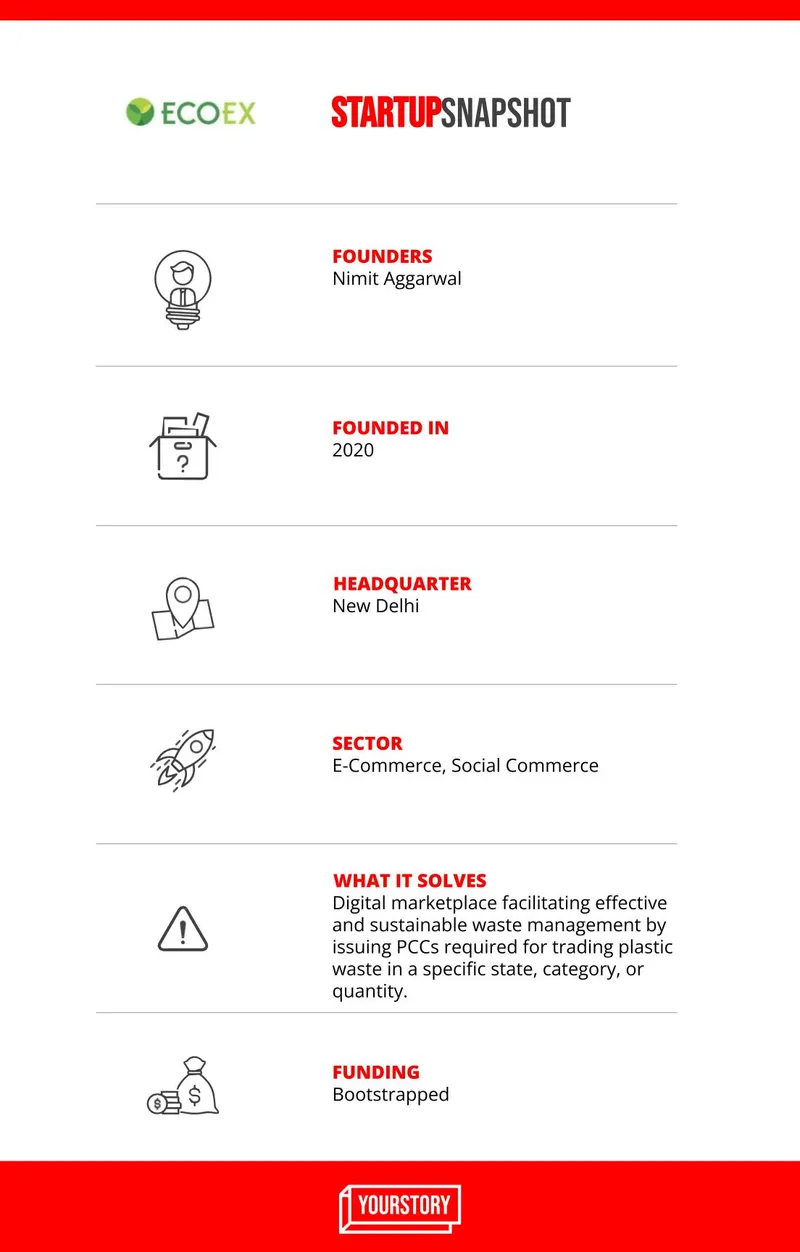Delhi-based EcoEx is regulating the waste management process in India
Delhi-based EcoEx facilitates effective waste management in India. The platform allows brands to interact with recyclers and waste management agencies to exchange plastic credit certificates (PCCs).
Waste management is a big challenge for India.
According to Statista, India accounts for roughly 18 percent of the world's population and 12 percent of global municipal solid waste generation. With India's population continuously rising, waste generation in the country is expected to see significant growth in the coming decades.
In India, all producers, importers, and brand owners (collectively known as PIBOs) must acquire plastic credit certificates (PCCs) for fulfilling the extended producer responsibility (EPR) guidelines set by the Central Pollution Control Board of India (CPCB).
Delhi-based startup facilitates effective waste management in India by issuing PCCs required for trading plastic waste in a specific state, category, or quantity. The waste management startup allows direct exchange of PCCs among recyclers, end-of-life processors, and waste collectors.
Further, EcoEx acts as a digital marketplace for plastic producers and brand owners to connect with a network of verified plastic recyclers to exchange PCCs for buying and selling their products.

How does it work
The concept of EPR was developed in Sweden in 1990. EcoEx simplifies these EPR guidelines mandated by the government for all stakeholders in the waste management ecosystem.
EPR is adopted by countries, including India, the US, and member countries of the European Union, for effective waste management.
“With EcoEx, we are trying to educate the PIBOs to sustainably and ethically recycle waste products and build a recycling community,” says Nimit Aggarwal, Founder and Director, EcoEx.
EcoEx allows PIBOs, recyclers, waste collectors, and waste management agencies to register on the platform.
The registered recyclers need to create an inventory of the products they buy or sell, post which they can put up an open or closed auction for interested waste management agencies or PIBOs.
Similarly, PIBOs need to mention their quotations requests on the platform for raw materials. The platform also allows them to create an annual report of their plastic usage and trade, which they need to submit to CPCB.
The startup receives a commission of 5 percent for every successful trade of raw waste materials on the platform.
At present, EcoEx has a pool of over 100 member partners, including nearly 60 recyclers, two waste-to-energy plants, five waste-to-oil plants, more than 20 waste management agencies, and over 40 waste collectors.
All of its recycling partners have Plastic Waste Management (PWM) and Consent to Operate certificates, and every collection partner has urban local bodies (ULB) tie-ups and endorsements.
Started from the bottom
Bootstrapped since 2020, Nimit founded EcoEx after a 10-year stint at his family’s recycling business BLS Ecotech. As an ecopreneur, he is trying to organise the recycling market in India to foster a sustainable waste management system.
However, it was not easy for Nimit to find people who shared his vision and wanted to work in the waste management sector.
He began with 14 people, who later moved on to other companies. At present, the startup has 10 people, including Nimit, and his co-founder and CEO, Akshaya Rath.
Challenges in the sector
The Indian waste management industry is huge and diverse. According to Waste Management Market in India 2014 – 2025—a report launched by NOVONOUS—the market is expected to be worth $13.62 billion by 2025.
Despite the market scope, the unorganised recycling community—which operates without adequate laws and regulations—poses a big challenge for EcoEx.
“There is a lack of adequate laws and awareness among the recyclers. In our portal, 99 percent of the recyclers initially had no clue that they needed to register themselves because no one was asking for the registration proof,” Nimit says.
He adds that the EPR model adopted by India is very archaic and ineffective. As per the Ministry of Environment, Forest and Climate Change guidelines, brands need to authorise recyclers to collect and recycle their plastic products in a city every month.
“We feel that India needs to adopt a combination of EPR models that are adopted by different countries. It cannot be just one solution for a vast country like India,” he says.
Future scope
EcoEx competes with waste management agencies and other waste exchange platforms, including Sanshodhan, Cercle X, Alucha, and EPR Loop.
The startup has established its strong presence in Delhi, Uttar Pradesh, Rajasthan, Uttarakhand, and Chhatisgarh.
According to Nimit, the company had made a revenue of about Rs 2 crore through commissions. Since its market launch in October 2020, it has facilitated the trade of 50,000 tonnes of plastic waste.
In FY 2022-23, EcoEx has set a target for facilitating the trade of 90,000 tonnes of waste. It also aims to expand its team in the next three months from 10 to 30 people.
Edited by Suman Singh










